
The Arabs, also known as the Arab people, are an ethnic group mainly inhabiting the Arab world in West Asia and North Africa. A significant Arab diaspora is present in various parts of the world.

Gibran Khalil Gibran, usually referred to in English as Kahlil Gibran, was a Lebanese-American writer, poet and visual artist; he was also considered a philosopher, although he himself rejected the title. He is best known as the author of The Prophet, which was first published in the United States in 1923 and has since become one of the best-selling books of all time, having been translated into more than 100 languages.
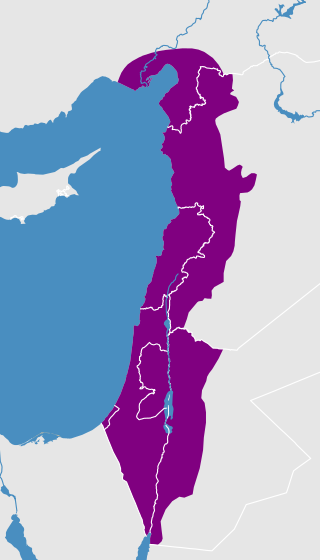
Levantine Arabic, also called Shami, is an Arabic variety spoken in the Levant, namely in Syria, Jordan, Lebanon, Palestine, Israel and southern Turkey. With over 54 million speakers, Levantine is, alongside Egyptian, one of the two prestige varieties of spoken Arabic comprehensible all over the Arab world.
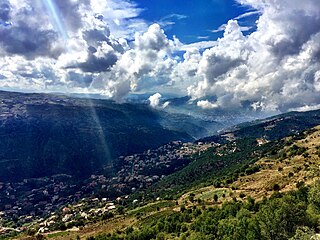
Baskinta is a Lebanese village situated at an altitude ranging from 1250 metres above sea level and climbs up to approximately 1800 meters of height at Qanat Bakish, making it one of the highest villages of Lebanon. It is located 43 kilometers north east of Beirut.
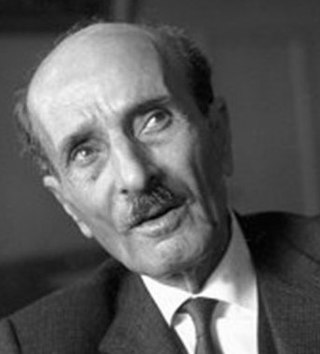
Mikha'il Nu'ayma, better known in English by his pen name Mikhail Naimy, was a Lebanese poet, novelist, and philosopher, famous for his spiritual writings, notably The Book of Mirdad. He is widely recognized as one of the most important figures in modern Arabic literature and one of the most important spiritual writers of the 20th century.

The Nahda, also referred to as the Arab Awakening or Enlightenment, was a cultural movement that flourished in Arab-populated regions of the Ottoman Empire, notably in Egypt, Lebanon, Syria, and Tunisia, during the second half of the 19th century and the early 20th century.
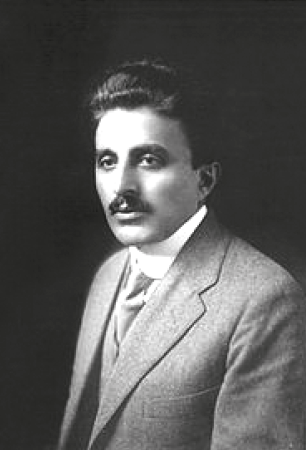
Ameen Rihani (Amīn Fāris Anṭūn ar-Rīḥānī; Arabic: أمين الريحاني / ALA-LC: Amīn ar-Rīḥānī; November 24, 1876 – September 13, 1940) was a Lebanese-American writer, intellectual and political activist. He was also a major figure in the mahjar literary movement developed by Arab emigrants in North America, and an early theorist of Arab nationalism. He became an American citizen in 1901.
The Mahjar was a movement related to Romanticism migrant literary movement started by Arabic-speaking writers who had emigrated to the Americas from Ottoman-ruled Lebanon, Syria and Palestine at the turn of the 20th century and became a movement in the 1910s. Like their predecessors in the Nahda movement, writers of the Mahjar movement were stimulated by their personal encounter with the Western world and participated in the renewal of Arabic literature, hence their proponents being sometimes referred to as writers of the "late Nahda". These writers, in South America as well as the United States, contributed indeed to the development of the Nahda in the early 20th century. Kahlil Gibran is considered to have been the most influential of the "Mahjari poets".
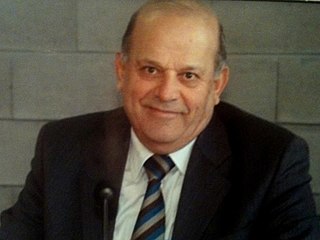
Mansour Eid (1944–2013) was a Lebanese writer, novelist, researcher and poet. Born in Bteddine El Loqch, a village of the Jezzine district in southern Lebanon on 12 February 1944. He completed his secondary studies in Our Lady of Mashmoushe School. He received a degree in Philosophical & Social Studies from Arab Beirut University and a degree in Arabic Literature from the Lebanese University and a PHD degree in Arabic Literature from Saint Joseph University.
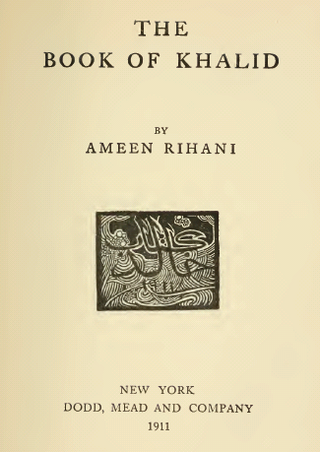
The Book of Khalid (1911) is a novel by Arab-American writer Ameen Rihani. Composed during a sojourn in the mountains of Lebanon, it is considered to be the first novel by an Arab-American writer in English. His contemporary, Khalil Gibran, illustrated the work, and the story is often seen as an influence on Gibran's own well-known book The Prophet.
Salom Rizk was a Syrian-American author, best known for his 1943 immigrant autobiography, Syrian Yankee, perhaps the best-known piece of Arab American literature in the middle part of the century. The book has been called "a classic of the immigrant biography genre", especially for the way Rizk's story portrays the American Dream and the virtues of cultural assimilation at the expense of his home country, which he finds loathsome when he returns for a visit. Rizk became well known enough that Reader's Digest sponsored him on a lecture tour around the United States as "the quintessential American immigrant". He also sponsored a drive for the Save the Children Federation, using advertisements in such magazines as Boys' Life to request families send their extra pencils, so that these could be donated to needy school-children around the world as a way of promoting freedom and democracy and fighting tyranny.

Lebanese Greek Orthodox Christians refers to Lebanese people who are adherents of the Greek Orthodox Church of Antioch in Lebanon, which is an autocephalous Greek Orthodox Church within the wider communion of Eastern Orthodox Christianity, and is the second-largest Christian denomination in Lebanon after the Maronite Christians.

Ameen Albert Rihani is a university professor, scholar and administrator. He is a professor of Arab American literature at Notre Dame University - Louiaze. He was the Vice President of Academic Affairs since 1997. In 2013 he became advisor to the President of NDU and the Secretary General of the Institute of Lebanese Thought.
The instance that marked the shift in Arabic literature towards modern Arabic literature can be attributed to the contact between Arab world and the West during the 19th and early 20th century. This contact resulted in the gradual replacement of Classical Arabic forms with Western ones. Genres like plays, novels, and short stories were coming to the fore. Although the exact date in which this reformation in literary production occurred is unknown, the rise of modern Arabic literature was "inseparable" from the Nahda, also referred to as the Arab Renaissance.

Naoum Mokarzel was an influential intellectual and publisher who immigrated to the United States from the Mount Lebanon Mutasarrifate.
As-Sayeh was an Arabic-language magazine founded in New York City by Abd al-Masih Haddad in 1912. It continued to be published until 1957. It presented the works of prominent Mahjari literary figures in the United States and became the "spokesman" of the Pen League which he co-founded with Nasib Arida in 1915 or 1916. Haddad published his own collection Hikayat al-Mahjar inside it in 1921.

Meraat-ul-Gharb is an Arabic-language newspaper founded and published in New York City by Najeeb Diab in 1899. By 1911, it was considered "the best Arabic newspaper" published in the United States. In 1908, Meraat-ul-Gharb was reported to be "one of the instruments which incited the Turkish military to its recent revolt" against the Ottoman Sultan's Government.

Abd al-Masih Haddad was a Syrian writer of the Mahjar movement and journalist. His magazine As-Sayeh, started in 1912 and continued until 1957, presented the works of prominent Mahjari literary figures in the United States and became the "spokesman" of the Pen League which he co-founded with Nasib Arida in 1915 or 1916. His collection Hikayat al-Mahjar, which he published in 1921, extended "the scope of the readership of fiction" in modern Arabic literature according to Muhammad Mustafa Badawi.

The Luzumiyat is the second collection of poetry by al-Ma'arri, comprising nearly 1600 short poems organised in alphabetical order and observing a novel double-consonant rhyme scheme devised by the poet himself.
Thurayyā 'Abd al-Fattāḥ Malḥas was a Palestinian poet and academic. She is considered a pioneer of free verse poetry among Palestinian women writers.















